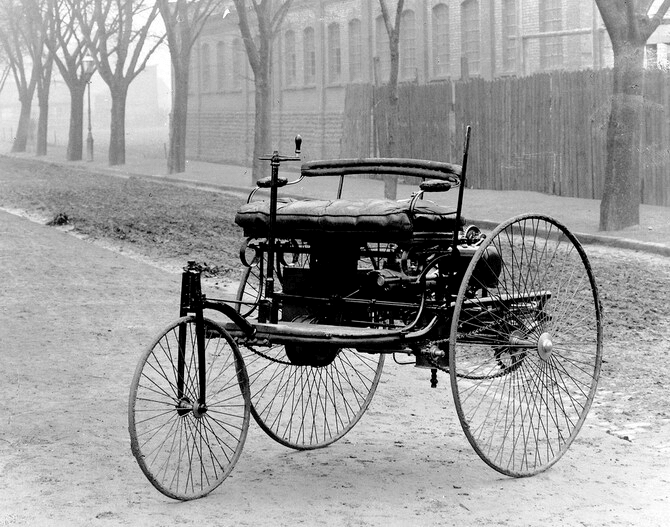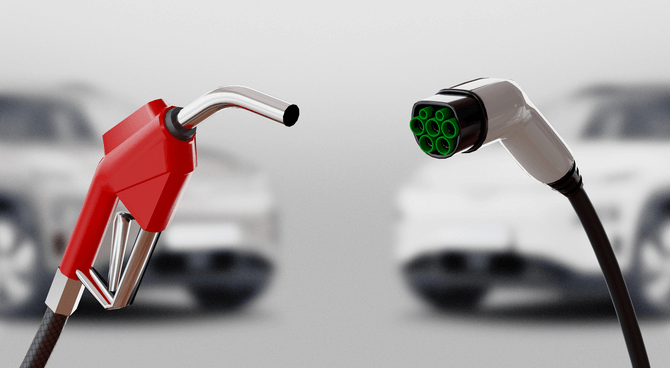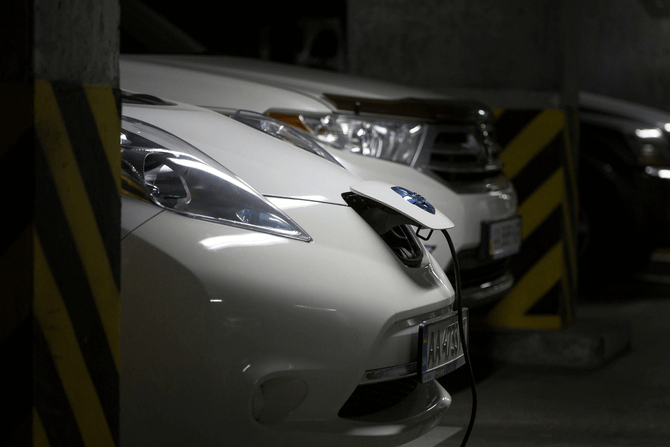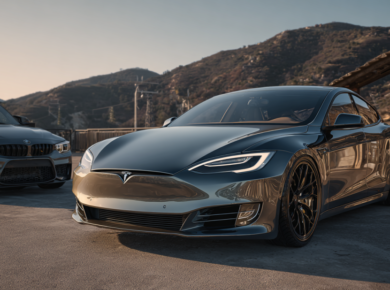According to information from Statista, there were a total of 84.19% of gasoline engine cars, otherwise known as internal combustion engine (ICE) vehicles, sold in 2022 compared to all sales volume in the USA. So, the number of cars in the US with gasoline engines is still significant. At the same time, the tendency to switch to more eco-friendly solutions, like electric and hybrid automobiles, cannot be neglected. For example, we may see that the authorities in California ban gasoline cars. With ClearVin, let’s talk about how efficient a typical gasoline-burning car engine is and discuss whether gasoline-powered vehicles have a future.
A Bit of History: When Was the First Gasoline Car Made?

The history of gasoline-powered automobiles begins with a fascinating progress of inventions. It all started in the late 1800s, when the first internal combustion engine was invented. An interesting fact: electric vehicles appeared prior to their ICE counterparts! The first operable EV was invented in 1837. It was a 16-foot truck powered by electromagnetic motors. Robert Davidson, from Scotland, is suggested as the inventor who put electric vehicles on the road.
The first car powered by a gasoline engine, The Benz Patent-Motorwagen, was built in 1885 by the famous German engineer, Carl Benz. After receiving a patent for this three-wheeled vehicle in 1886, it has become the first gasoline engine car put into mass manufacture. Speaking of powertrain, the Benz Motorwagen had an 1-liter, single-cylinder engine that performed only ⅔ hp. The vehicle’s top speed reached around 10 mph (16 km/h). This invention marked the beginning of the mass production of gasoline engine cars.
A key influence on producing gasoline-powered vehicles was the invention of the assembly line production approach by Henry Ford at the beginning of the 20th century. It was a revolution in the automotive world. Later, in 1908, the Ford company rolled out the worldwide-known Model T, an affordable and reliable gasoline-powered car that became a symbol of the automobile age.
With technology improving, car engineers and automakers started to develop vehicle models with advanced efficiency of gasoline engines, making it possible to increase the car’s performance. As a result, the General Motors specialists created a V8 gasoline car engine, allowing for more powerful car configurations. The introduction of vehicle motors with fuel injection in the 1950s also contributed to the rapid improvement of the fuel delivery system installed in automobiles.
Speaking of modern times, the automobile industry has been steadily turning toward alternate fuel sources and electric vehicles in recent years. However, in many regions of the world, gasoline-powered vehicles remain the dominant option.
Why Gasoline Engine Cars Can Lose Their Positions

There are a lot of studies that state gasoline direct injection engine cars need to be abandoned. With thousands of ICE vehicles on the city roads, their huge number have caused the shift toward eco-friendly options. There are real concerns about the effects of keeping gasoline cars. First and foremost, it is harmful for the environment. The U.S. Energy Information Administration stated in its summary that when you burn a gallon (around 3.8 liters) of gasoline, approximately 19 pounds (ca. 9 kg) of carbon dioxide (CO2) go into the atmosphere. So, the combustion of gasoline in a car engine also leads to toxic fumes in the exhaust. That is why governments all around the world are taking steps to reduce gasoline car engine emissions. As an example, we can outline the U.S. Clean Air Act, which is aimed at regulating all sources of exhaust emissions.
There are also plans to prohibit the manufacturing and sales of gasoline-powered cars in the future. The authorities in Europe have banned ICE cars, restricting their sales after 2035 and allowing only zero-emission vehicles to be sold. The US state of California will also prohibit new gasoline vehicles, including SUVs and trucks, starting in 2035. So, we will see the tendency of gasoline cars being banned more frequently and clearly now.
Another significant reason why shifting toward alternative fuel sources is so important is the availability of oil and natural gas resources. According to the Worldometer data, it is estimated that we have oil reserves that will run out in just around 40–47 years at the current level of consumption. As a result, we need swift eco-friendly innovations instead of the old-fashioned gasoline car engine to keep the logistics and infrastructure afloat even before we use the resources available. Hybrid, electric, and hydrogen vehicles are considered vital solutions here to replace gasoline and diesel cars.
Electric Cars vs. Gasoline Cars

The trend of automakers launching new electric vehicle lineups is rising. But you may wonder, “Are electric cars better than gasoline cars?” Let’s dive deeper and discover key details on this topic.
The decreased environmental impact of electric vehicles compared to gasoline ones is the most obvious point to consider here. Gasoline-powered cars release greenhouse gasses, contributing to global warming. Electric automobiles, on the other hand, emit no fumes when driving, making them more environmentally friendly.
In addition, the electricity a driver needs to charge their EV may be generated from renewable energy sources, including solar or wind power, reducing reliance on fossil fuels. However, there is still a significant environmental impact from eco-friendly automobiles. Electric vehicle manufacturing requires a lot of resources, and electric batteries or other car components may not be properly recycled and dumped after an EV is not operable anymore.
On a plus side, electric vehicles do not require significant investments in their maintenance compared to gasoline-powered cars. Despite the fact that the price tag for an EV is higher, you can expect cheaper long-term service and charging costs. Because electric vehicles do not have many parts that we can find in an ICE vehicle, they require less maintenance. For example, electric engines do not need oil changes, and the EV charging price is substantially lower than the cost of gasoline or diesel.
The End of Gasoline Cars: Should We Expect?

At the same time, some issues should be addressed before electric vehicles conquer the roads completely. First and foremost, the EV charging infrastructure is not properly developed in many countries around the world. This sets significant limits on the range of electric vehicles compared to gasoline cars. So, it makes ICE automobiles a more suitable option for drives over long distances, where EV charging stations are not so widespread.
Another important advantage that gasoline and diesel engine cars have is their low cost compared to EVs or even hybrids. It makes the latter ones more accessible for motorists, and such options as online auto auctions, for example, those from AutoBidMaster, have become more popular. You can find a huge number of pre-owned gasoline cars in decent condition. And you don’t need to spend a fortune to get one. However, the situation may change over time. Such factors as more EV manufacturers and tax credits from governments are contributing to the fact that electric car prices will drop.
Also, many automakers invest significant funds to create hydrogen fuel cell technologies. This can be a great alternative for gasoline car motorists since they will be able to make use of the great performance and convenient drives offered by ICE vehicles.
A milestone in defining whether gasoline engine cars have a future will be 2035, a year when ICE vehicles will be banned in many countries. Until then, a huge amount of work should be done by all stakeholders, such as automakers, businesses, governments, and automotive engineers. By developing new technologies, investing heavily in eco-friendly solutions, and scaling the network of EV charging stations, they can achieve impressive results and properly retire gasoline cars.
Wrapping Up
Without any doubt, alternatives to gasoline-powered cars are vital to saving the environment and making vehicles cheaper for motorists. At the same time, we can state that automobiles with internal combustion engines still have a future. We need a little more time so the green technologies in the automotive world can become more common and advanced.
Whether you own a gasoline engine car, electric vehicle, or hybrid automobile, use a VIN decoder from ClearVin or reveal the VIN history by a free license plate lookup. We have a lot of great solutions to offer, including special conditions for automotive dealers to get a car dealer report. Along with that, we are always happy to lend a hand. Contact us online to get more details about the vehicle background examination. You can also call us at: +1 (844) 268-5991 (8:00 AM – 3:00 PM EST, Monday to Friday).









